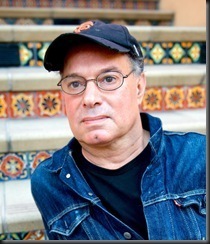 David-Elijah Nahmod is a film critic and reporter in San Francisco. His articles appear regularly in The Bay Area Reporter and SF Weekly. You can also find him on Facebook and Twitter.
David-Elijah Nahmod is a film critic and reporter in San Francisco. His articles appear regularly in The Bay Area Reporter and SF Weekly. You can also find him on Facebook and Twitter.
David developed Post Traumatic Syndrome Disorder (PTSD) after surviving gay conversion therapy as a child and has found that many in the LGBT community suffer from severe, often untreated emotional disorders due to the extreme anti-gay traumas they endured. This column chronicles his journey.
I Am Sylvia
If time travel were possible, I would go back to the early 1960s and give Sylvia a hug.
Sylvia was a short, strange looking (to my young eyes) woman who would sit in the park across the street from the elementary school I attended. I now realize that she was mentally impaired, which I was incapable of understanding as a young lad in the second and third grades.
Sylvia was a sweet, gentle woman. She always smiled at us kids and said hello when our teachers brought us to the park for recess.
All that changed one day, when one of my classmates called Sylvia a “retard”, laughing uproariously as he did so. Within seconds, the whole class joined in, tormenting this poor woman who had done us no wrong. Our teachers sat nearby, talking among themselves. They could clearly see and hear what we were doing, yet they made no move to stop us.
This went on for several days. Sylvia soon stopped coming to the park.
One day, as our teachers led us down Bay Parkway in Brooklyn towards the park, we spotted Sylvia across the street. “Look! It’s the retard!” we shouted, laughing uproariously at our own childish ignorance. “Hey, Sylvia, you’re a retard!”
For the first and only time, we got a reaction. “Drop dead!” Sylvia screamed as her eyes flooded with tears. “Leave me alone!” Our maniacal laughter reached a fever pitch, and still our teachers did nothing. I never saw Sylvia again.
Now, a half-century later, I can no longer remember what Sylvia looks like. I seem to recall that she was middle aged. I imagine that she’s long dead by now. I barely gave her a second thought after that last time I saw her, or for many years thereafter–so what has me thinking about her now?
Today, in 2016, I am Sylvia. I’m a middle aged gay man who survived a childhood riddled with abuse from my own parents, which caused me to develop a fairly intense case of Post Traumatic Stress Disorder. Over the years I’ve had severe manic episodes, nightmares, flashbacks, and blackouts which I can barely remember. Through it all I’ve endured public ridicule not from kids, but from adults. In 2010 I was nearly driven to suicide after a series of gay and lesbian bloggers inflamed anti-gay and anti-Semitic hate against me for nothing more than a cheap laugh. Gay advocacy groups called me an anti-gay bigot when I asked for their help in putting a stop to this.
As a journalist I’ve reported on middle aged gay activists who participate in the bullying of suicidal LGBT kids while The Trevor Project, the organization which is supposed to be saving these kids lives, knowingly looks the other way. The American Foundation for Suicide Prevention assures me that they will do nothing about this. Spokespersons at Facebook, Twitter and WordPress have told me that they will take no action when their platforms are used for these purposes, including in cases where suicidal teens and people with mental health issues are targeted.
Fifty years after we kids tormented Sylvia to the point of tears, nothing has changed.
Why didn’t our teachers stop us? Why didn’t they teach is the difference between right from wrong? Why, after all these years, do people still not know how to treat each other? Where is our compassion for each other? Where is our humanity?
I regret few things more than how we kids treated Sylvia on that blustery Brooklyn day those many years ago. My own eyes well up with tears as I recall the tears streaming down her cheeks. I can only hope that Sylvia had a good life after I last saw her.
Mostly, I hope that we as Americans, will one day take an honest look in the nearest mirror.
This will hopefully lead to more people thinking about what’s going on in our communities. Which can in turn lead to more people speaking up when they witness bullying and other kinds of cruelty.
_______________________________________________

